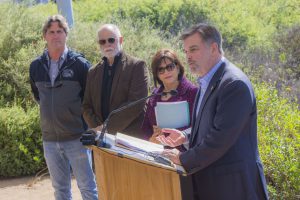South County Cities to Sue International Boundary and Water Commission

A group of South County public officials has grown tired of what they see as the federal government’s inaction to address the issue of sewage from Mexico spilling into San Diego.
The San Diego Unified Port District and the City of Chula Vista have joined the City of Imperial Beach in filing a lawsuit against the International Boundary and Water Commission (IBWC) alleging violations of United States laws designed to protect water quality and public health.
The coalition feels that suing is their last resort, as they have previously tried to have this addressed through diplomatic, political, and administrative channels.
“We don’t want to do this, but it is our last resort to get them to move to action,” said Chula Vista Mayor Mary Casillas-Salas. “Not studies, not words, but to do something to stop the sewage.”
While the problem is not new, it reared its head again last year when millions of gallons of wastewater from Tijuana spilled into South San Diego beaches after a sewage system failure.
A binational investigation by IBWC and its Mexican counterpart, the Comisión Internacional de Límites y Aguas (CILA) found that at least 28 million gallons were spilled over a four-day period. This may have been the most alarming incident; however, it was not an isolated occurrence, according to local officials. From 2015 to date, the coalition has documented at least 376 wastewater spills that have reached south county beaches.
The lawsuit aims to compel both IBWC and its contractor, Veolia Water, to “rectify” the alleged environmental violations and take action to halt, capture, and treat the contaminated wastewater that is reaching the U.S. through the Tijuana River.
“They [IBWC] can invest in infrastructure, they can allocate more staff, more time, they can increase their collaboration with Mexico, and pressure the Mexican government,” stated Paloma Aguirre, Director of Wildcoast’s Marine and Coastal Program.
IBWC is the international entity responsible for water agreements and has in the past funded border infrastructure projects. So far, there has been no statement from IBWC, as they are prevented by policy from commenting on pending litigation.
The untreated sewage forced south county beaches to be closed at least 28 days so far this year, according to San Diego Port Commissioner Dan Malcolm.
“That is almost half of 2018, and that is absolutely and completely unacceptable,” said Malcolm.
Imperial Beach Mayor Serge Dedina also spoke of a “lack of interest” by the Mexican government to do their part in addressing this shared issue.
“I believe that if IBWC, if CILA, if (Baja California) Governor Vega, if (Mexican) President Peña Nieto, if President Trump wanted to resolve this issue tomorrow, they could do it,” he expressed. “There is an obvious lack of interest in supporting these communities that are surrounded by toxic wastes, and it is obvious that Tijuana – which has the most polluted beaches in the world, has no interest in protecting the environment.”
This past weekend, the Baja California state government issued a statement announcing an investment to enhance sewage system infrastructure “in order to prevent spills, and thus keep the Tijuana River Watershed free of contaminants.”
Tijuana’s water utility, CESPT, has stated that they have projects slated to improve two key pump stations in their wastewater conveyance system.
On previous occasions, Mexican officials have expressed that they are willing to work together with the U.S. to find a definitive solution, but are limited by the lack of funding.







